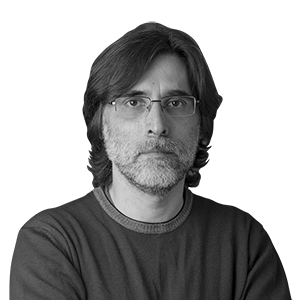The Lyceum inherits "the discrepancy" between Katharina Wagner and Iréne Theorin
The Rambla Theatre premieres a new production of 'Lohengrin' directed by Richard Wagner's great-granddaughter.


Barcelona"Only Katharina Wagner could allow herself to reinterpret Lohengrin in a new dramaturgy in which the good are bad and the bad are good," says the artistic director of the Liceu, Víctor Garcia de Gomar. To put it with Wagnerian grandiloquence, blood would legitimize Richard Wagner's great-granddaughter to turn history upside down and transform the immaculate hero of the opera into a production of Lohengrin with stage direction by Katharina Wagner, which will premiere at the Liceu on March 17, and which will have six performances until March 30. It is the same production that was due to premiere in March 2020, but was canceled due to the coronavirus pandemic. "It was already very well-developed then," says Josep Pons, who will conduct the Liceu Orchestra in all six performances. Incidentally, among other elements, the production includes a robotic swan and an artificial lake, which are adding complexity to the rehearsals.
The cast is Wagnerian in nature, with German tenor Klaus Florian Vogt (Lohengrin), Norwegian soprano Elisabeth Teige (Elsa), Icelandic baritone Ólafur Sigurdarson (Telramund), and Austrian bass Günthereis ud). Nothing is simple in the Wagnerian universe, and Theorin will sing in five of the six performances, but not on the opening night, when the role of Ortud is taken by Finland's Miina-Liisa Värelä. This was announced by the Liceu itself a few weeks ago in a statement explaining that "this cast adjustment is in response to artistic disagreements between Iréne Theorin and the production's stage director, Katharina Wagner." Neither Katharina Wagner nor Iréne Theorin participated in the press conference held this Thursday at the Liceu. "Katharina didn't feel comfortable attending the press conference," Garcia de Gomar excused. When questioned about the "disagreements," he said that "they stem from a disagreement external to the theater," a "discussion" the director and the soprano have been having for some time.
If they can't stand each other, how is it that they share this production? "We are heirs to that problem," admits the Liceu's artistic director. Lohengrin was supposed to premiere in 2020, and when we closed the contract with Iréne Theorin, the conflict [with Katharina Wagner] had not yet arisen. Iréne has been the Wagnerian reference in this theatre, where she has sung Siegfried, Götterdämmerung, Tristan and Isolde and The Walküre, And we didn't want to lose her in any way. We weren't willing to lose her, but rather to seek a space for understanding." The solution: for the Swedish soprano not to participate in the premiere. "Let's all strive to be professionals in order to overcome obstacles," concludes Garcia de Gomar. explains Katharina Wagner in The Vanguard, the discrepancy arose at the 2022 Bayreuth Festival, when Theorin, when booed by the audience The Walküre, reacted by making a fool of himself. Wagner considers it an "inappropriate" response.
The nuances of Ortud and Lohengrin
The situation is at least eccentric, but in any case the Ortud of the 17th is in good hands because, according to Josep Pons, "the Ortud of Miina-Liisa Värelä is magnificent." Curiously, The Finnish soprano already replaced Theorin at the Liceu in Ariadne on Naxos in 2021"I've always loved playing this character for all its nuances," says Värelä. And there's no shortage of nuances in Katharina Wagner's work. Richard Wagner's opera, premiered in 1850 in Weimar, tells the story of Lohengrin, the knight of the swan who appears to defend Elsa, accused of murdering her brother Gottfried, heir to the Duchy of Brabant. The accusation is made by Telramund, who loses the fight to Lohengrin, who spares his life. The moral conflict of the opera revolves around the condition Lohengrin imposes on Elsa as his knight: that she never ask him her name or her origins. Ortud, Telramund's wife, plots with magic and intrigue, like Lady Macbeth, to discover Lohengrin's identity and regain her lost power.
"Yes, I'm the witch, the villain in the film," says Värelä. But the Ortud imagined by Katharina Wagner takes on another dimension. "He's the only character who deliberately seeks the truth." "I've had to slightly rethink his role," says Värelä. Klaus Florian Vogt, a Wagnerian tenor who has made his mark at the Liceu, is in the same boat. He must play a Lohengrin "who takes on special significance because of the secret he hides": he is Gottfried's murderer, and Katharina Wagner demonstrates this in the opera's first scene, in which the audience and a robotic swan witness the crime. "This secret has an impact on the way it is sung," admits Vogt. Elsa lies between the two. "I have to adapt to both, because now he is more evil, and Ortud wants to help me. And that has to be believable," explains Elisabeth Teige, making her Liceu debut. "This is my second Elsa; I played the first one nine years ago, and now I've found other vocal and dramatic nuances," adds Teige.
The cast is completed by Günther Groissbock, Roman Trekel, Jorge Rodríguez-Norton, Gerardo López, Guillermo Batllori, Toni Marsol, Carmen Jiménez, Raquel Lucena, Mariel Fontes, Gloria López, Elisabeth Gillming, Yuliia Safonova, and Mariel. And it's worth highlighting the important role of the Liceu Choir, "which is extraordinary," as maestro Josep Pons assures. "We are very proud of the theater's permanent ensembles," says Pons, happy to have a good instrument to take on this Wagner, still heir to "the articulations of Schubert and Mendelssohn."
